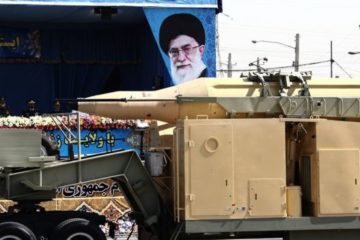How Trump Could Bring Peace to the Middle East: Noah Feldman

(Bloomberg View) —When it comes to Middle East policy, usually all roads don’t lead to Rome. But President Donald Trump has good reason to visit the pope on the same circuit as his peace mission to Israel and Saudi Arabia.
Trump’s plan, which has a small but not trivial chance of success, depends on creating a grand anti-Iran alliance running through Jerusalem and Riyadh. To put it bluntly, it doesn’t involve too many countries or people that the rest of the world likes. If he can get Pope Francis to bless the idea, even obliquely, that would add a moral dimension to the brutal business of dealmaking that is to come.
To begin with, it’s worth sketching the outlines of the only Middle East peace deal that could realistically emerge from Trump’s initiative. I wouldn’t put the odds of success much higher than 5 percent.
But remember, if I’m right, that means Trump has a 1 in 20 chance of going down in history as a truly great dealmaker president. He’ll deserve the Nobel Peace Prize — and might actually get it. Even a one-term presidency can acquire historical luster through Middle East peace. Just ask Jimmy Carter.
The Trump initiative has two main moving parts, which together explain Trump’s proposed itinerary.
Part one is for the Saudis and other Gulf states to force the Palestinians to accept a two state solution in which they make substantial sacrifices regarding territory, the right of return for refugees, and shared sovereignty of Jerusalem. What’s in it for the Saudis is the expansion of the anti-Iran Sunni crescent to include the U.S. — and Israel.
A normalized relationship between Saudi Arabia and Israel would actually do a lot of good for the kingdom and its neighbors. For one thing, the American Jewish community — and the associated Israel lobby — could then fully embrace Saudi Arabia as a friend and ally, instead of viewing Riyadh with long-term suspicion. That would help consolidate the U.S.-Saudi relationship for an era in which American dependence on Saudi oil is lessening at a steady pace.
Fundamentally, Saudi Arabia has to worry about the possibility that someday Israel could ally with Iran and non-Arab states — an alliance capable of encircling the Sunni world. That was Israel’s strategic vision before the 1979 Iranian revolution made Iran into an enemy. Israel enjoyed close relationships at the time with Iran, Turkey and some parts of East Africa (at least those that weren’t bought and owned by the Saudis). Lots of Israeli geostrategists believe that, once the anomaly of the Iran’s Islamic regime passes away, this will again be Israel’s ideal regional alignment.
The Saudis now have a once-in-a-lifetime chance to change that geostrategic picture permanently. The risk for them is that Islamic State-style radicals will condemn the monarchy for making peace with Israel. But frankly, those sorts of radicals already think the Saudi monarchy is fundamentally illegitimate for its relationship with the U.S. Brokering peace between Israel and the Palestinians won’t leave the Saudis worse off than they are now.
Part two of the deal — probably substantially harder to achieve — is for Trump to pressure Israeli Prime Minister Benjamin Netanyahu and ultimately the Israeli public to agree to a two-state solution. For the deal to be acceptable to the Saudis (not to mention the Palestinians), it needs to be not much different from the two-state solution offered by Ehud Barak at Camp David Summit and at the Taba Summit during the Clinton administration.
Netanyahu, who never embraced such a deal, will certainly tell Trump that he doesn’t have to make as generous an offer as Barak did. After all, the Palestinians are in a weakened negotiating position compared to 1999 and 2000. They made the epic mistake of using violence in the second intifada, thus destroying the Israeli left and creating the conditions for Israel’s building of a barrier and expansion of settlements. Consequently, Netanyahu faces an Israeli public that mostly questions Palestinian sincerity about peace and in many instances believes — for ideological, religious, or strategic reasons — that a two-state solution would be a terrible mistake.
Trump will have to respond with an offer that Netanyahu can’t refuse. On the positive side, that includes the tremendous benefits of economic acceptance by the Arab world — and political acceptance throughout Europe. After a two-state solution accepted by the Palestinians and all Sunni Arab states, Israel would no longer be a pariah nation. It would have achieved global historical acceptance. And Netanyahu would be the author of the full global establishment of Israel, a historical achievement that won’t be lost on the son of a historian.
But an “offer you can’t refuse” also includes a threat. To succeed in pushing Netanyahu, Trump would have to be prepared to say that if Netanyahu blocks the deal, Trump will tell the world that the Israeli prime minister, not the Palestinians, was the barrier to peace.
Even that might not end Netanyahu’s domestic political career, so there would also have to be long-term consequences for the U.S.-Israel relationship. Trump would have to credibly suggest that if he, a Republican friend to Israel, turned on Netanyahu and the Israeli right, it would give cover to the American mainstream left to try to fundamentally change U.S. support for Israel.
It’s not a particularly credible threat. Trump and Netanyahu both know that because of American Jewish support for Israel, Congress would never punish the Israelis for failing to reach a deal. That’s part of why the odds of Trump’s success are so low.
The other great challenges lie in the details of finding a two-state deal that Netanyahu would be prepared to offer and that the Palestinians would be prepared to take. There will be spoilers in the form of terrorist attacks, although it now seems probable that they wouldn’t come from Hamas, which has signaled its willingness to accept a two-state solution.
The details of pressure will be ugly, and the compromises necessary to get to yes will involve major sacrifices of justice and rights on both sides. In short, divine intercession from Rome or anywhere else would be a big help to this peace initiative. Here’s hoping God is on the side of Donald Trump — and peace.
This column does not necessarily reflect the opinion of the editorial board or Bloomberg LP and its owners.







No Comment